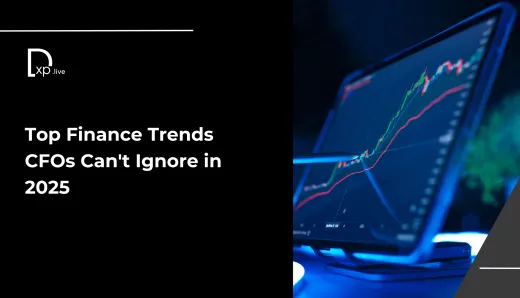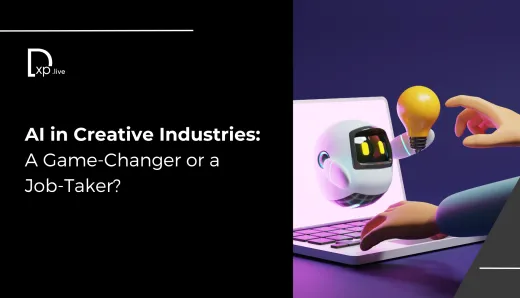Blockchain Gaming Platforms Transforming Engagement and Revenue

KEY TAKEAWAYS
- AI, VR, and blockchain are shaping the future of gaming.
- Blockchain enables seamless asset transfers across games.
- Players gain true ownership of in-game assets through blockchain.
- Developers unlock new profit streams like token sales and royalties.
Did you know the blockchain gaming industry is projected to reach $65 billion by 2025? This rapid growth underscores how blockchain technology is revolutionizing gaming experiences and reshaping profit models for developers and players alike. By enabling true ownership of in-game assets through non-fungible tokens (NFTs) and facilitating transparent, decentralized economies, blockchain introduces unprecedented opportunities for monetization and engagement. As traditional gaming paradigms evolve, understanding blockchain's impact becomes essential for stakeholders aiming to navigate and thrive in this dynamic landscape.
What Are Blockchain Gaming Platforms?
Blockchain gaming platforms integrate blockchain technology into video games, revolutionizing the gaming experience. These platforms enable decentralization, where game operations run on distributed ledgers, reducing reliance on central authorities. Players gain true ownership of in-game assets, such as characters or items, represented as NFTs (Non-Fungible Tokens). Transparency ensures fairness, as game rules and transactions are immutable and auditable on the blockchain. Additionally, interoperability allows players to use assets across multiple games, enhancing versatility.
Popular examples include Axie Infinity, known for its play-to-earn model, Gods Unchained, a strategic card game offering asset ownership, and The Sandbox, a metaverse empowering creators. Blockchain gaming redefines player engagement by combining transparency, ownership, and innovation, paving the way for a decentralized gaming future.
Why Blockchain Is a Game-Changer for Player Engagement
Blockchain is disrupting the way players engage with the stakeholders in the manners of ownership, earnings, and, importantly, trust. Skins, NFTs, and tokens can actually belong to the player now because of blockchain’s unchangeable nature which allows for contracts of trading and porting from one platform to another.
Play-to-earn is a model similar to learning-to-earn, where every task in-game earns the players some cryptocurrency, making gaming an entertaining process and a way of earning.
Blockchain also supports decentralized decision-making through DAOs, which can allow players to decide on changes and updates and guarantee a player-first scenario.
Thirdly, there is no question of cheating as all transactions are publicly transparent, and hence, Blockchain creates trust among the players and developers involved. When the three entities of ownership, earnings, and trust merge through blockchain, gambling is being revolutionized and the experiences are made more engaging than before.
Profits Redefined: Benefits for Game Developers
Technology within the blockchain is causing disruptions within the game development industry by announcing additional streams of earnings for developers. Tokenization of assets directly to the customer also allows developers to generate revenues from the sale of assets within game environments and subsequent trade-in tokens on secondary markets. Due to direct real-time payment between users, blockchain eliminates unnecessary intermediaries, saving on costs and increasing revenue.
Further, revenue is indefinite from NFT sales of characters and items, in-game stores and purchases, and smart contracts with constant royalties as players buy and use assets.
An excellent example is Axie Infinity – a blockchain game that post-hype has seen increased profit margins due to features that include players owning games’ assets, mining resources to sell to other players, and creating economic prosperity for itself by making a lot of profits and for developers.
Challenges Facing Blockchain Gaming Platforms
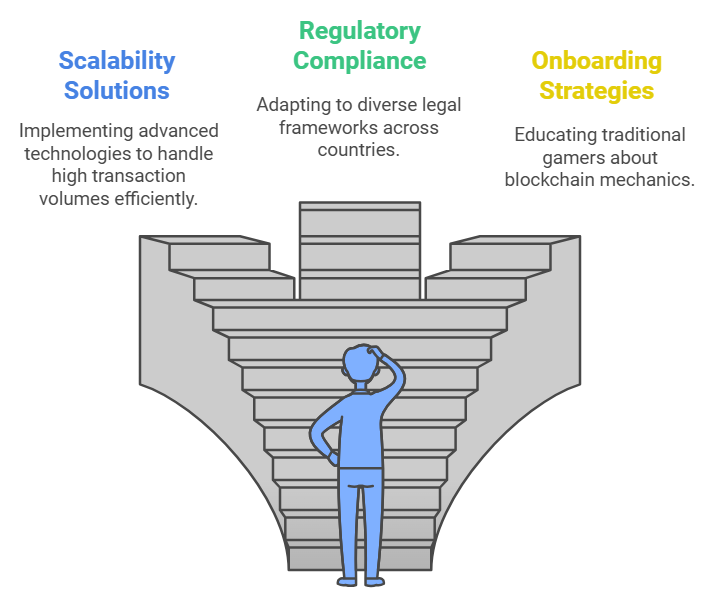
The future of blockchain gaming platforms has several possibilities, among them some major problems. The feature of scalability becomes problematic as high volumes of transactions cause network clogging that results in slow processing and equally high fees that are unwanted in gaming.
Regulative issues arise, as particular countries adopt different cryptocurrency legislation, which poses a problem for the developers and players.
Onboarding is another issue; conventional gamers are generally ignorant of decentralized currencies and keeping up with the mechanics of blockchain games.
Also, something that is very topical is environmental impact. However, such decentralized systems as traditional blockchain networks are very destructive to the environment draining plenty of energy. Perhaps potential solutions include migrating consensus models to more efficient models such as the proof-of-stake.
How Blockchain Enhances Gaming's Future
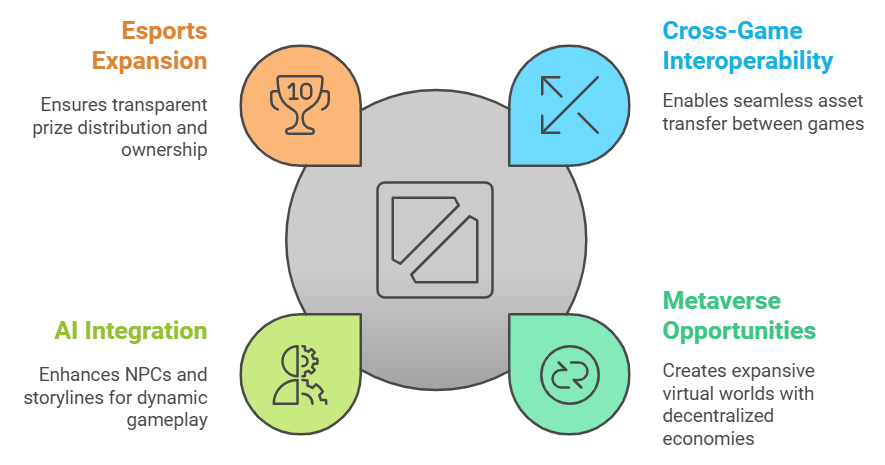
Blockchain technology is revolutionizing the gaming industry by introducing several key advancements:
Cross-Game Interoperability: Blockchain enables players to transfer assets and characters seamlessly between different games, enhancing the gaming experience and providing true ownership of digital items.
Immersive Metaverse Opportunities: By leveraging blockchain, developers create expansive virtual worlds where players can engage in decentralized economies, own virtual real estate, and participate in unique experiences, fostering a vibrant metaverse ecosystem.
Integration with AI: The combination of blockchain and artificial intelligence leads to smarter non-player characters (NPCs) and adaptive storylines, resulting in more dynamic and personalized gaming experiences.
Expanding Esports: Blockchain ensures transparent prize distribution and verifiable ownership in esports, building trust among participants and streamlining reward mechanisms.
These innovations collectively enhance player engagement, security, and the overall gaming landscape.
Addressing Misconceptions About Blockchain Gaming
Many argue that blockchain gaming is a passing novelty; on the contrary, it has a lot of potential in the long term. With the use of blockchain within the gaming industry, games are able to give back ownership of items claimed within a game to the player, enabling healthy virtual economies.
Apart from fun, blockchain gaming serves purposes that include education and virtual events. Gamified learning may use blockchain while schools and universities may offer rewards for students’ performance via a blockchain system learning, and virtual events may use blockchain for the management of the assets and interaction of participants.
Issues of security are resolved with Blockchain, as it is immutable and entirely transparent by nature. Every transaction is logged and stored, thus minimizing both fraud and the alteration of data integrity.
Why Now Is the Perfect Time to Invest in Blockchain Gaming
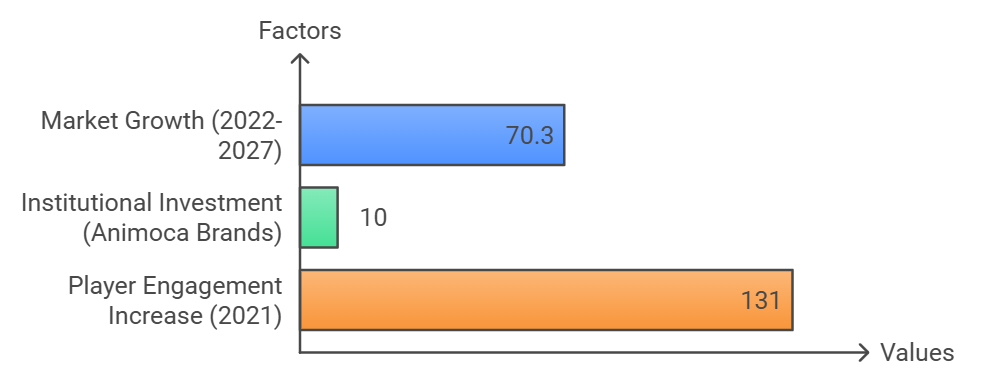
Investing in blockchain gaming is increasingly compelling due to several key factors.
Growing Market Trends: The blockchain gaming market is experiencing rapid expansion, with projections indicating a growth from USD 4.6 billion in 2022 to USD 65.7 billion by 2027, reflecting a CAGR of 70.3%.
Institutional Support: Major companies are actively investing in blockchain gaming platforms. For instance, Animoca Brands has secured significant funding, including a $10 million investment in November 2024, underscoring strong institutional confidence in the sector.
Rising Player Interest: Player engagement with blockchain games is on the rise. Data from 2021 shows a 131% increase in active users in the first half of the year, highlighting growing gamer interest in blockchain-based gaming experiences.
These factors collectively suggest that now is an opportune time to invest in blockchain gaming.
In summary, Blockchain gaming is revolutionizing engagement and profits, creating a new paradigm in digital value. By merging immersive gameplay with decentralized ownership, it’s reshaping how players and developers interact. Blockchain gaming isn’t just redefining games; it’s redefining value in the digital world.
Step into the future of gaming! Discover how blockchain is reshaping the digital universe—follow us now and stay ahead in the game!
FAQs:
1. Are blockchain games really profitable?
Blockchain games can indeed be profitable significantly. I just want to stress that P2E mechanics, in-game assets, and Games as a service, NFTs allow players to acquire real value through play to earn models, and investors can benefit from decentralized ecosystems and improved reach and engagement for developers.
2. How is blockchain used in gaming?
Blockchain was used to enhance the security of in-game transactions and to allow for ownership of game assets as well as for the management of decentralized game economies. It has made things clear and generated trust while developing a new way for players and developers to cooperate.
3. What is the role of blockchain in revolutionizing the gaming industry through in-game assets?
Players can buy, sell, and sell in-game items as NFTs, and these items have real-market value in this type of blockchain. It grants gamers true ownership of virtual items and opens a new way to generate revenues for both the consumer and the provider.
4. Is blockchain the future of gaming?
In fact, blockchain is already redefining gaming by providing a decentralized economy and secure ownership of assets while creating new revenue streams. It’s revolutionizing player experiences and opening up an infinite number of opportunities in game production.

